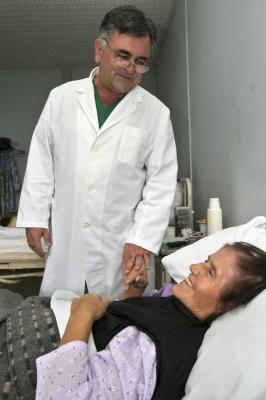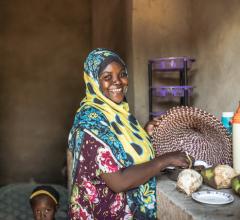
October 5, 2015 — First results from the largest international comparison of the treatment of elderly patients with breast cancer have shown there are substantial differences in the use of surgery, hormone therapy and chemotherapy between European countries.
The European Registration of Cancer Care (EURECCA) study compared the treatment patterns of 119,125 patients aged 70 and older in Belgium, Ireland, The Netherlands, Portugal, Poland and the UK, who were diagnosed with non-metastatic (stage I, II or III) breast cancer between 2000 and 2014. The study also compared the number of patients alive five years after breast cancer diagnosis.
Marloes Derks, M.D., a Ph.D. student at the Department of Surgery in the Leiden University Medical Center (Leiden, The Netherlands), shared study results at the 2015 European Cancer Congress. Data from the EURECCA study will be used to find treatment approaches that are associated with improved outcomes in elderly patients with breast cancer. "Our research findings will contribute to improved treatment guidelines for elderly patients with breast cancer, which will lead to a more personalized treatment approach for this vulnerable patient group," Derks said.
The research shows that the use of surgery, hormone therapy or chemotherapy varies substantially between countries depending on the stage of the breast cancer in elderly patients.
"Based on a comparison of data from Belgium, Ireland and The Netherlands, surgery was omitted most frequently in older patients with stage III breast cancer. The omission of surgery was lowest in Belgium at 15 percent, followed by The Netherlands at 28 percent and the highest was in Ireland at 37 percent," said Derks.
The use of hormone therapy and chemotherapy (systemic therapy) in Belgium, Ireland, The Netherlands, Portugal and Poland varied substantially depending on the stage of the breast cancer.
"For instance, the use of adjuvant hormone therapy in older patients with stage I disease was the lowest in The Netherlands at 21 percent, while in Ireland, Belgium, Portugal and Poland the use of adjuvant hormonal therapy varied between 82-88 percent. Chemotherapy use was the lowest in The Netherlands for all stages of breast cancer in elderly patients. For example, in elderly patients with stage III disease, the use of chemotherapy was the lowest in The Netherlands at nine percent, followed by Ireland (26 percent), Belgium (30 percent), Portugal (58 percent) and the highest in Poland at 78 percent," said Derks.
"Our initial results show that there are large treatment differences among different European countries due to a lack of evidence for the treatment of older patients with breast cancer. With this study we hope to be able to raise awareness about this specific group of patients and we also hope that it will lead to more research in order to develop evidence-based treatment guidelines for older patients with breast cancer."
Derks and her colleagues are currently calculating the number of patients alive five years after breast cancer diagnosis. "Initial findings from the relative survival analysis using data from Belgium, Ireland and The Netherlands have shown that elderly patients diagnosed with stage II and III breast cancer in Ireland and Belgium have a better relative survival compared to The Netherlands. We will be able to compare the treatments for different stages of the disease and to identify approaches that are linked to improved outcomes in elderly patients with breast cancer," said Derks.
Breast cancer is mainly a disease of old age, and 40 percent of new breast cancer cases occur in patients aged 65 and older. With increasing life expectancy and an aging population, this percentage is expected to rise. However, most research is focused on younger patients. "In clinical trials, patients who are included are younger and fitter than older patients with breast cancer. Older patients are not comparable with younger patients as they often suffer from other diseases apart from breast cancer. They also have a higher risk of complications after breast surgery and more often experience adverse events associated with hormone therapy and chemotherapy. Consequently, research results found in younger patients cannot be directly translated to the older population with breast cancer. Therefore, clinical studies that include patients of all ages are better suited to investigate treatment approaches in elderly patients with breast cancer.
"In order to improve treatment approaches and outcomes in elderly patients with breast cancer, more observational studies based on data from large national population registries of older patients are needed. The quality of these national registries should be improved and a European collaboration to share this data should be encouraged. Furthermore, with regard to the increasing number of older patients with breast cancer, there is an urgent need to conduct age-specific clinical trials," she concluded.
Prof. Peter Naredi, the ECCO scientific co-chair of the Congress, who was not involved in the research, commented: "I am very pleased that collaborative groups present outcome data for different tumor types with a national perspective at this Congress. In this presentation, Dr. Derks and co-workers show how differently we treat older breast cancer patients in different European countries. These kind of data are absolutely necessary if we want to be able to decrease the inequalities in cancer care throughout Europe."
The European Registration of Cancer Care (EURECCA) study is mainly funded by the European Society of Surgical Oncology (ESSO).
For more information: www.essoweb.org


 April 18, 2024
April 18, 2024 








